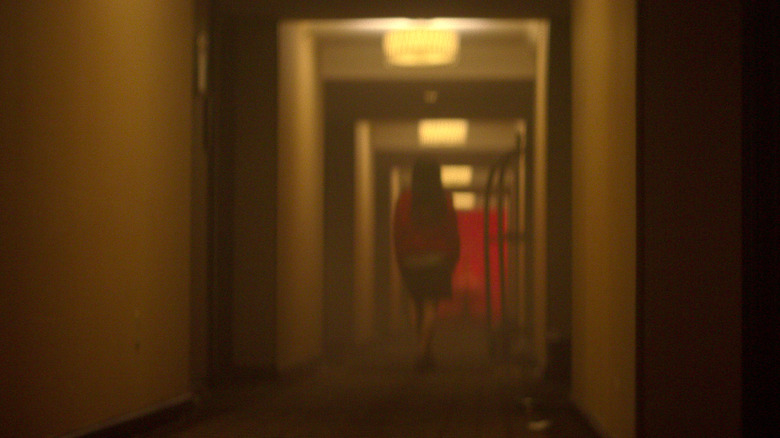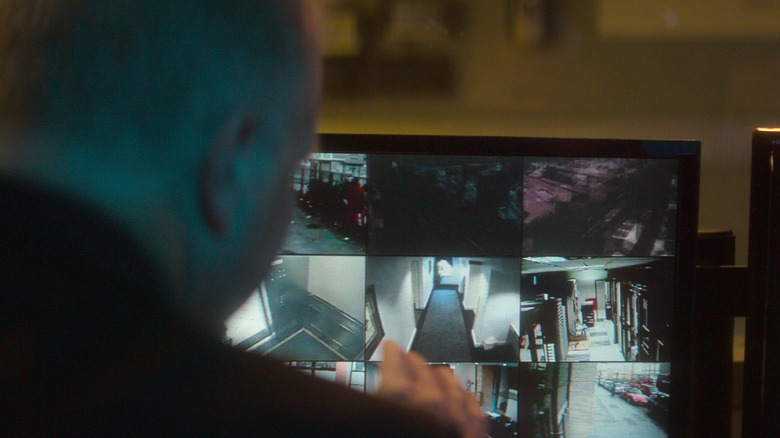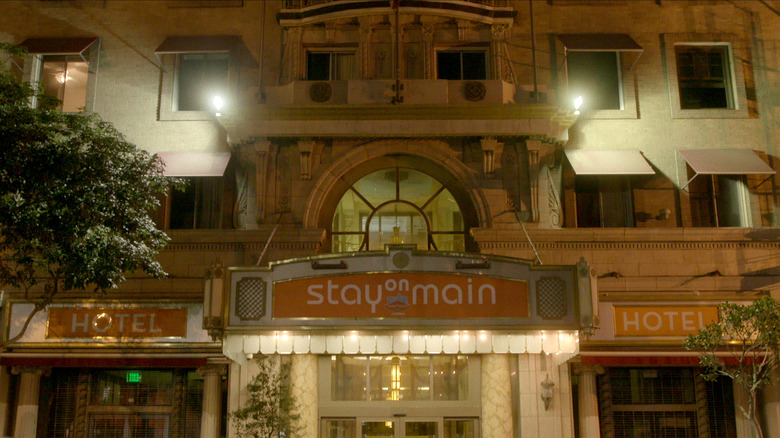The Daily Stream: Crime Scene: The Vanishing At The Cecil Hotel Confronts Websleuths With Their Inability To Face Reality
(Welcome to The Daily Stream, an ongoing series in which the /Film team shares what they've been watching, why it's worth checking out, and where you can stream it.)
The Series: "Crime Scene: The Vanishing at the Cecil Hotel"
Where You Can Stream It: Netflix
The Pitch: In 2013, 21-year-old Chinese-Canadian tourist Elisa Lam was found dead in a water tank on the roof of the Cecil Hotel in Downtown Los Angeles. Her disappearance and death was a mystery that made international news, though it later came out — once all the facts were in — that she had, in all probability, accidentally drowned while experiencing a bipolar episode.
In the meantime, compounded by a viral video with the last known footage of Lam, demonstrating erratic behavior on the hotel elevator, the case became an internet phenomenon. The first season of shows and podcasts like "True Detective" and "Serial" was just over the horizon in 2014, and this one, too, became an early whirlpool for websleuths, sucking people down into the depths of obsession and amateur detective work, all in the dubious name of justice for Elisa.
Working backward from that summary of knowledge is how I went into my viewing this week of "The Vanishing at the Cecil Hotel." I wasn't familiar with all the details of the Eliza Lam case, but I was aware of it enough through pop culture osmosis to know how it would end. I was also aware, just from peeking at its Rotten Tomatoes scores, that Joe Berlinger's four-part docuseries is neither a critical darling nor an audience favorite. The average viewer, someone who's not a true-crime buff and doesn't easily subscribe to conspiracy theories (or have much respect for those who do), might not have the patience for the way this series is structured.
Why it's essential viewing
The days when Fox Mulder's "I Want to Believe" poster on "The X-Files" seemed inspiring have given way to a stark reality where fringe beliefs are no longer cute and might even be dangerous, insofar as they hold the ability to provoke unhinged individuals or whole mobs and even gain a foothold in mainstream politics. With that in mind, my recommendation of "The Vanishing at the Cecil Hotel," comes with the caveat that I see this series as a wake-up call, not as an excuse to entertain wild theories.
As I watched it, I was coming out of a deep, dark hole, where I had spent the whole weekend researching and writing an article about why Netflix's "Unsolved Mysteries" needs to talk more about mental health. I was still getting over a cold at the time, and trying to make my brain work and synthesize all this information about real-life cases of unexplained deaths was like hacking through a jungle with a rusty machete.
In a weird way, that might have put me in the right mental state to receive "The Vanishing at the Cecil Hotel" on its own terms. Some have accused the series of irresponsibility if not outright exploitation in its handling of the Eliza Lam case. On the surface, it suffers from some of the same problems that "Unsolved Mysteries" does. Chief among those is its willingness to let facts take a backseat to speculation.
Some of the voiceovers and reenactments are admittedly tacky. In contrast to many "Unsolved Mysteries" episodes, however, members of Eliza Lam's family are not on-camera here as interviewees. The family was reticent about talking to the media and was not initially forthcoming, even with police, about the severity of Lam's bipolar condition.
A documentary with more than one subject
In "The Vanishing at the Cecil Hotel," Berlinger lets the case unfold much as it did in real life so that the viewer re-experiences it the way the public did. Questions abound as to why Lam and the elevator door in the viral video were acting so strangely, how she could have found her way up to the roof and into a water tank with a lid over it, and who else might have been involved in her death.
Since so little was known of what really happened to her, people were free to get hung up on coincidences and other details and project their own elaborate fantasies onto the situation. Not enough attention was paid to the psychological factors that may have been at play in Lam's death ... which is kind of the whole point I was making in that other article about "Unsolved Mysteries."
A common criticism of "The Vanishing at the Cecil Hotel" is that it's one of those Netflix series where they could have told the story succinctly, but instead padded it out with more episodes than it really needs. Berlinger tends to go off on tangents, circling back around, in effect, to more than one documentary subject, to the point where it's not always clear what the central thesis is meant to be if it could even be said to have one.
First, there's the subject of Lam herself, whose case serves as our entry point. Then, there's the Cecil Hotel, which has its own checkered past and history as a magnet for trouble. Beyond that, there's the larger online world of people who self-identify as "YouTuber" or are labeled as "Websleuths" in talking head segments.
A place for the marginalized
When Lam books a trip to the Stay on Main Hotel, she doesn't know that it's a façade or hotel within a hotel, sectioned off from the Cecil with its own lobby and three floors of rooms within the same building. The real hotel sits on the edge of the notorious Skid Row, which comes across as the L.A. equivalent of Hamsterdam, the fictional zone of Baltimore, where drugs and prostitution are legalized under a policy of containment, on HBO's "The Wire."
Here we see how even a city or business can be prone to push aside problems and leave them in exile rather than deal with them. If a fraction of the people posting Tumblr tributes to Elisa Lam had been there to help her when she was alive, maybe things would have turned out differently. So it goes with the residents of Skid Row, which is left a dumping ground for the homeless and a place where anything goes, crime-wise.
Despite its nice lobby, the Cecil itself becomes a breeding ground for homicides, suicides, and drug overdoses. Tourists share the elevator with tenants, who rent their rooms at a weekly or monthly rate. At one point in its history, the hotel even attracts the presence of serial killer Richard Ramirez, the infamous Night Stalker.
Lam is under-medicating with four different pills, one of them an anti-psychotic, when she enters this place. Berlinger's treatment of her story is as discursive as Mikita Brottman's treatment of the Rey Rivera case in her book, "An Unexplained Death: The True Story of a Body at the Belvedere." Substitute Lam for Rivera, and the Cecil for the Belvedere, and you have this series, which is as much about people's fixations on Lam as it is about her.
The question of coincidences
As "The Vanishing at the Cecil Hotel" sets up questions and knocks them down with logical explanations, I came away feeling like there was only really one answered question in the Elisa Lam case. That's the question of coincidences. The case bears remarkable similarities to the plot of the J-horror film "Dark Water," based on a story from the Koji Suzuki collection of the same name. In the 2005 American remake, a little girl, coincidentally named Cecilia, encounters the ghost of another girl who drowned in a water tank on a roof.
We hear further talk of synchronicities, the buildup of coincidences, another of which is the fact that there's a tuberculosis test called the LAM-ELISA, and a tuberculosis outbreak occurred in the Cecil Hotel right after Elisa Lam's body contaminated the building's water supply. Since the test and the movie existed years beforehand, the viewer is left to wonder how it is that art and life were seemingly able to anticipate this awful occurrence. Was there some kind of weird foreknowledge floating around out there in the collective unconscious?
I'm sitting there watching this part of the series on my laptop with my Beats by Dre headphones on, when my wife (who can't see my monitor) turns around from the kitchen sink and starts questioning whether I should really be drinking tap water and not bottled water like her. That's a coincidence, too. Unfortunately, such questions aren't much help to police when they're investigating the practical matter of someone's death.
Before "Dark Water," Suzuki wrote the novel "Ringu," which also foresaw the potential for a video to go viral and curse individuals, chain letter style. For one musician, his own videos and the one of Lam on the elevator turned into a curse like that.
Chasing phantoms
You can see why Berlinger, known for his "Paradise Lost" documentaries — about the imprisonment of the West Memphis Three during the Satanic panic — might be attracted to the Elisa Lam case. At one point, the internet mob obsessing over her death turns on a death metal singer named Morbid who happened to stay at the Cecil Hotel.
Like "Room 237," the 2012 documentary about the many off-the-wall interpretations of Stanley Kubrick's "The Shining," "The Vanishing at the Cecil Hotel" gives theorists space to talk about the Lam case, which really has nothing to do with them beyond being something that piqued their curiosity. By the end, Berlinger manages to tie together the disparate documentary threads and turn things around on them and us, showing how people come to terms with the truth or have a hard time accepting it when it doesn't jibe with their conception of the case. By now, they're so far "Down the Rabbit Hole," as one episode title puts it, that it's as if they're experiencing a mass form of the same paranoia and persecutory delusions that might drive a woman to hide from hallucinations in a water tank.
A few years ago, /Film ran an "Unpopular Opinion" defense of "Book of Shadows: Blair Witch 2," Berlinger's non-documentary follow-up to the first "Paradise Lost" film. Britt Hayes called the movie an "unsung masterpiece of horror metafiction." While I wouldn't call "The Vanishing at the Cecil Hotel" a masterpiece, I do think it serves, in a similar fashion, as an interesting meta-treatise on true crime and the tendency we all have to look for a bad guy and a bigger explanation beyond ourselves. The corridors of the human mind can be as strange and lonely as a haunted hotel.





